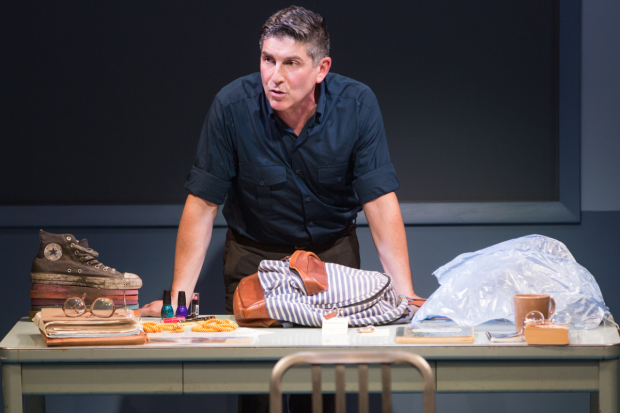The Absolute Brightness of Leonard Pelkey
A terrible crime rocks a small town on the Jersey Shore in James Lecesne’s new solo play.

(© Matthew Murphy)
Leonard Pelkey died for our sins — specifically for the sin of not being fabulous enough. That's the takeaway from James Lecesne's exquisitely acted, beautifully written, and thoroughly facile new solo play The Absolute Brightness of Leonard Pelkey, now making its off-Broadway debut at the Westside Theatre after an earlier run at Dixon Place. The story is as sympathetic as it is predictable, leaving the viewer with the hollow feeling of having one's beliefs reinforced, but not challenged.
Fourteen-year-old Leonard Pelkey has gone missing. His Aunt Ellen contacts Detective Chuck DeSantis to find him. The detective immediately starts snooping around Leonard's old stomping grounds. In his hunt for Leonard, he speaks to a British expatriate drama teacher, an elderly German watch repairman, and even a kindly old mob wife. A picture emerges of a highly flamboyant young gay man, not afraid to dance to the beat of his own drum and flaunt his queerness to the world. When Leonard's body emerges, the detective suspects a hate crime.
Lecesne (author of the Academy Award-winning film Trevor and cofounder of the LGBT suicide prevention charity the Trevor Project) plays each role with specificity and care so that you easily forget it's just him up there. Under the direction of Tony Speciale, Lecesne's gorgeously crafted language captures a unique cadence and perspective for each of his subjects, giving us a sense of not only them as individuals, but the larger ecosystem of this small town on the Jersey Shore. He's like a one-man Laramie Project. Sadly, something about this script feels trapped in a time warp with that landmark 2000 play.
Lecesne reveals in a program note that Leonard is completely fictitious, but he really didn't need to write that for us to know it. Despite Leonard's idiosyncrasies, he feels like the product of a public relations campaign, crafted to achieve maximum sympathy with the off-Broadway crowd: He loves the theater, owns an antique pocket watch (but not a cellphone), visits the elderly, and possesses an encyclopedic knowledge of women's hairstyles from the 1980s. We hear how his zest for life inspired so many to be better versions of themselves. Even the projected image of Leonard (a blurry photo of a blond Caucasian) seems designed to make the subject familiar, nonthreatening, and even attractive (projections by Aaron Rhyne). In the age of nationwide marriage equality, do we really need such an airbrushed sacrificial figure in order to come to the conclusion that murdering gay teens is wrong?
Leonard's miracles and martyrdom make him more akin to a Catholic saint than a real human teenager (many of whom are not nearly so pleasant and handsome, but still deserve our compassion). Even Leonard's primary tormenter, Travis, is a crude stereotype: addicted to video games and planning to join the army (a transparent strike against both American militarism and kids today with their violent video games). It all seems designed to leave the audience with a satisfying feeling of self-righteousness.
None of this is to say that violence against gay teens isn't a real problem. According to the Gay, Lesbian, and Straight Education Network (GLSEN), 36 percent of LGBT-identified American students experienced some form of physical harassment at school in the past year. It seems doubtful, however, that those seeing this show in Manhattan will be unaware of this problem. Nor are they likely to be OK with the murder of gay teenagers. Leonard Pelkey would be a remarkable theatrical endeavor in a place like Jamaica or Russia, where serious physical violence is still an everyday problem for gay adults, not to mention teens. Off-Broadway, it's just not adding much to the conversation. A writer and performer as transfixing as Lecesne has the ability to challenge us to dig much deeper.
For instance, why did the killer really do it? In 2015, would any self-respecting lawyer still use the "gay panic" defense? And what are the consequences of sentencing a minor to decades of incarceration? "I guess we'll never know," Detective DeSantis tells us before rattling off what has become the most hackneyed of Shakespeare's moralisms: "This above all — to thine own self be true." In this case, it seems that we don't really want to know, but would rather settle for a feel-good ending. That is the real tragedy of Leonard Pelkey.









